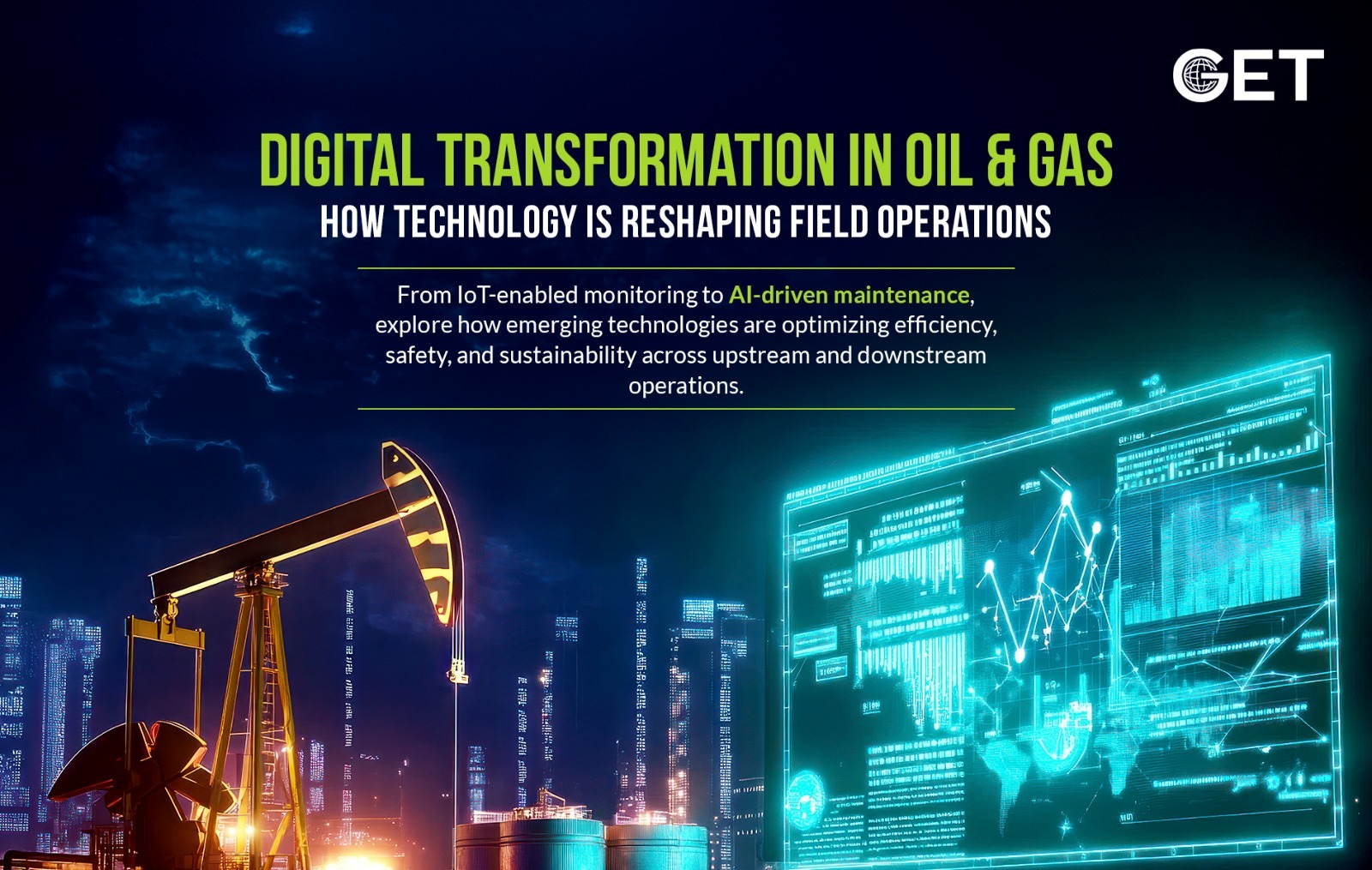
The oil and gas industry has been notorious for its poor relationship with legacy systems and manual processes; this is all set to change. Digital transformation is no longer the buzzword, it is the force that compels efficiency, safety, and sustainability operations. In the case of field operations: specifically, this transition has resulted in a radical change in the manner in which data is gathered, analyzed, and used to carry out on-time decisions.
At GET Global Group, we are well aware that the digital oilfield is not a dream of the future but the present we are influencing day by day, step by step, innovation after innovation.
Historically, the oil and gas oil field operations have been reactive. When a piece of equipment broke they were fixed. Production decisions were made using insufficient past information. However, with the introduction of IoT sensors, edge computing, and AI-centered analytics it is transforming into the world of predictive and prescriptive operations.
Pumps, valves, and pipelines can now be fitted with sensors that sense temperature pressure, vibration, and flow. By feeding such data streams through AI and machine learning models, operators can become able to spot most failures prior to their occurrence, reduce the loss of uptime overall, and schedule maintenance optimally. The result? Reduced OPEX, reduced unplanned shutdowns, and workplaces that are safer.
Fieldwork is usually under severe, isolated conditions: whether offshore platforms or deserts or arctic locations. Previously this implied low connectivity and slow decision making. Under present circumstances, satellite-based communication, 5G networks, and edge devices allow the immediate transfer of data even in the most remote spots.
This has transformed the operations into real-time visibility. Live performance dashboards are now publicly visible to managers sitting in centralized real-time control centers in which they can run diagnostics and deploy resources quickly and accurately. Installed on mobile devices and on wearable devices with AR/MR capabilities, field personnel are enabled by mobile apps that guide them through complex procedures or put them in contact with remote experts would turn every field worker into a digitally enabled problem solver.
Digital transformation is emerging as one of the most effective bulwarks in an industry such as the one that involves safety. Ensuring safety during an emergency, using a solution such as the digital twin simulation, will allow operators to experiment on emergency procedures and system behavior without risking life and property.
Crawlers and drone surveillance are taking over especially in dangerous locations like in a flare stacks, underground pipelines, or small and confined areas, instead of humans doing the checking. Such a transition is not merely improving safety but decreasing inspection cost and bringing faster turnaround time.
Safety is not treated as an afterthought at GET Global Group: it is integrated into all digital levels that we assist our clients to adopt.
Automation has come in as a facilitator with skill labor shortages and pressure on costs increasing. As well as data entry, valve operations, and inventory management, SCADA systems, robotic process automation (RPA), and intelligent control systems are automating the redundant processes.
It is now possible to manage drilling rigs, change production rates as also redirection of logistics all by means of remote operations centers (ROCs) using multiple functions that are many miles away. Not only does this shift to a centralized approach cut down on the physical presence in the field (and the risks thereof), but also leaves the workforce leaner and more agile due to its ability to react to market developments in real-time.
Environmental concerns about the oil and gas industry are increasingly raising their eyebrows. Digital transformation is expected to give the tools required to move the operations in line with environmental, social, and governance (ESG) objectives.
However, with carbon tracking software and the involvement of emissions monitoring and water usage analytics now affords companies the opportunity to track, monitor, and report their environmental impact with clarity. In addition, operators are using energy optimization tools to minimize fuel use, flaring, and methane leakage, such tools are aiding the industry in converting sustainability from a compliance requirement into a business necessity.
While the benefits are clear, digital transformation in oil and gas is not without its challenges. Many companies face hurdles such as:
It is when a reputable transformation ally such as GET Global Group comes into play. Having a profound knowledge of the industry and a strong technology ecosystem, we assist the companies in going through the digital journey with a confidence of a milestone at a time.
Read Also- How to Start a Career in Renewable Energy in the UAE
It is not that the field operations will be automated in the future, but through collaboration. It will be erected on the collaboration of human human and machine intelligence. The human workforce is also changing with the revolution in AI, robotics and cloud platforms: instead of tactical implementation, employees will be oriented on strategic thinking, supervision, and innovation.
The oil and gas business curdles in the field operations. And with digital transformation, that heartbeat is actually getting faster, stronger and smarter. Real-time surveillance, automation, safety technology, sustainability technologies technology is remodeling every square foot of the oilfield.
To any companies willing to cope with this change, GET Global Group is determined to fulfill its role of an escort into the bright future, as intelligent, efficient, and resilient.
Read Also- Well-Being at Work: Why Workforce Health Matters in Remote Operations

By Get global | February 12, 2026

By Get global | February 6, 2026

By Get global | January 27, 2026
The oil and gas industry operates under unpredictable conditions which make it difficult for projects to succeed. When something goes wrong, it goes wrong fast. The situation develops into dangerous conditions which result in multiple fires, injuries, shutdowns and environmental damage that lasts for many years. The oil and gas […]

By Get global | January 20, 2026
In 2026, the oil and gas landscape is no longer just about “steel and soil”. It’s about data, decarbonization, and digital fluency. For professionals in the upstream oil and gas sector and beyond, the career ladder has been replaced by a high-tech elevator and technical training courses are the floor […]

By Get global | January 15, 2026